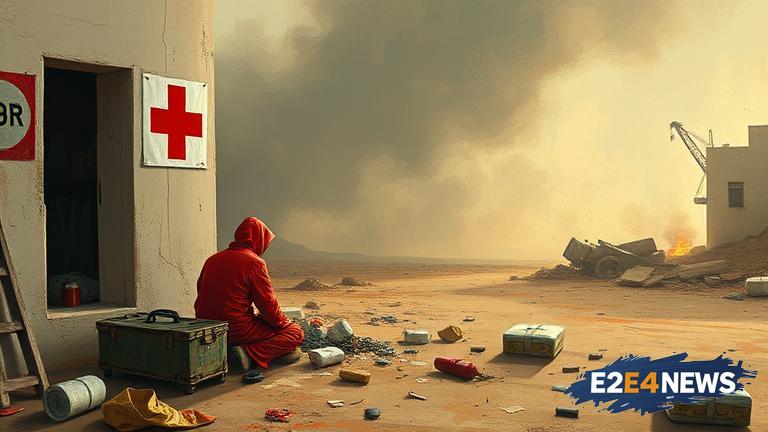The International Committee of the Red Cross (ICRC) has come under fire after disturbing footage emerged showing Israeli hostages being held in dire conditions, with many appearing to be starved and malnourished. The footage, which was released by Israeli officials, has sparked widespread outrage and accusations that the Red Cross is neglecting its duty to protect prisoners of war. The ICRC has a long history of providing humanitarian aid and support to those affected by conflict, but its response to the plight of Israeli hostages has been criticized as inadequate. The organization has been accused of failing to provide sufficient food, water, and medical care to the hostages, who are being held by Hamas militants in the Gaza Strip. The footage shows the hostages, who include both military personnel and civilians, looking gaunt and emaciated, with some appearing to be on the brink of starvation. The conditions in which they are being held are said to be squalid, with inadequate sanitation and hygiene facilities. The Red Cross has been criticized for its slow response to the crisis, with many accusing the organization of being more concerned with maintaining its neutrality than with providing aid to those in need. The Israeli government has been vocal in its criticism of the Red Cross, with officials accusing the organization of abandoning its principles and neglecting its duty to protect prisoners of war. The incident has sparked a wider debate about the role of the Red Cross in conflict zones and its ability to provide effective humanitarian aid. Many have questioned whether the organization is truly independent and impartial, or whether it is beholden to the interests of certain governments or groups. The Red Cross has responded to the criticism by stating that it is doing everything in its power to assist the hostages and to improve their conditions. However, its efforts have been hindered by the fact that it does not have direct access to the hostages, who are being held in a secure facility in the Gaza Strip. The organization has called on all parties to the conflict to respect the principles of international humanitarian law and to allow it to provide aid to those in need. Despite its efforts, the Red Cross is facing growing criticism and scrutiny, with many accusing it of failing to live up to its principles and to provide effective humanitarian aid. The incident has also highlighted the challenges faced by humanitarian organizations in conflict zones, where they often face significant obstacles and challenges in providing aid to those in need. The Red Cross has a long history of providing aid in conflict zones, but its response to the crisis in Gaza has been criticized as inadequate. The organization has been accused of being too slow to respond to the crisis and of failing to provide sufficient aid to those in need. The incident has sparked a wider debate about the role of humanitarian organizations in conflict zones and their ability to provide effective aid. Many have questioned whether the Red Cross and other humanitarian organizations are truly independent and impartial, or whether they are beholden to the interests of certain governments or groups. The Red Cross has responded to the criticism by stating that it is committed to providing humanitarian aid to all those in need, regardless of their nationality or background. However, its efforts have been hindered by the fact that it does not have direct access to the hostages, who are being held in a secure facility in the Gaza Strip. The organization has called on all parties to the conflict to respect the principles of international humanitarian law and to allow it to provide aid to those in need. The incident has highlighted the challenges faced by humanitarian organizations in conflict zones, where they often face significant obstacles and challenges in providing aid to those in need. The Red Cross and other humanitarian organizations must navigate complex political and military landscapes in order to provide aid to those in need. The incident has also highlighted the importance of holding humanitarian organizations accountable for their actions and ensuring that they are transparent and effective in their provision of aid. The Red Cross and other humanitarian organizations must be subject to scrutiny and criticism in order to ensure that they are providing the best possible aid to those in need. The incident has sparked a wider debate about the role of humanitarian organizations in conflict zones and their ability to provide effective aid. Many have questioned whether the Red Cross and other humanitarian organizations are truly independent and impartial, or whether they are beholden to the interests of certain governments or groups. The Red Cross has responded to the criticism by stating that it is committed to providing humanitarian aid to all those in need, regardless of their nationality or background. The organization has a long history of providing aid in conflict zones, but its response to the crisis in Gaza has been criticized as inadequate. The incident has highlighted the challenges faced by humanitarian organizations in conflict zones, where they often face significant obstacles and challenges in providing aid to those in need. The Red Cross and other humanitarian organizations must navigate complex political and military landscapes in order to provide aid to those in need. The incident has also highlighted the importance of holding humanitarian organizations accountable for their actions and ensuring that they are transparent and effective in their provision of aid.





